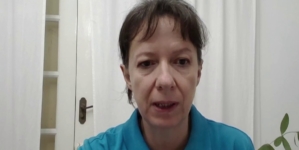-
Darius Rucker wants his kids to be doctors or lawyers, not musicians - about 1 min ago
-
WWE Legends Pitches Unique Storyline Idea for LA Knight - 38 mins ago
-
Elaine Hendrix rushed to hospital on stretcher from ‘Dancing with the Stars’ - 43 mins ago
-
Blue Jays capitalize off of Dodgers' struggling offense with bounce back Game 4 win | The Herd - 52 mins ago
-
Into the Wild Heart of Börzsöny: Hungary’s Hidden Mountain Paradise - about 1 hour ago
-
Falcons Owner Makes Generous Donation to Hurricane Melissa Relief - about 1 hour ago
-
At least 250,000 children affected by Hurricane Melissa in Jamaica - about 1 hour ago
-
College Football Playoff Predictions: Who Is Making The Field Entering November? - 2 hours ago
-
Despite Increased Air Traffic, Flight Delays Drop by 80 Percent - 2 hours ago
-
Woman Fears Flying—Passenger’s Dog Senses Anxiety, and Everything Changes - 2 hours ago
China Tries To Cover Up Toxic Mining Disaster: WSJ
A Chinese mining company has been seeking to cover up the extent of a dam collapse that brought ecological disaster to Zambia’s Kafue River Basin, according to a report by The Wall Street Journal (WSJ).
Why It Matters
Beijing has invested heavily in Africa’s vast reserves of energy, metals and minerals, securing access to essential commodities while expanding its geopolitical clout across the continent as Washington’s influence wanes. Zambia—one of the world’s largest copper producers—has become a major partner in this push, hosting several Chinese-owned or -backed mining operations.
But this cooperation has come with costs. As in many other low-income nations participating in China’s Belt and Road Initiative infrastructure framework, Zambia is heavily indebted to Chinese state banks, and Chinese companies have been accused of violating labor and environmental regulations.
Newsweek reached out to China Nonferrous Metals Industry Group, the Chinese Embassy in Zambia, and Zambia’s Environmental Management Agency via emailed requests for comment.
What To Know
The February 18 collapse of a earthen dam at a Sino-Metals mine released roughly 50 million liters of acidic waste into a tributary of Zambia’s Kafue River, causing a massive fish die-off as far as 70 miles downstream and forcing the nearby city of Kitwe to shut down its water supply.
The Kafue River Basin is a key economic lifeline for Zambia and supports more than 60 percent of the southern African nation’s population. Following the disaster, officials ordered Sino-Metals, a subsidiary of the Chinese state-run China Nonferrous Metals Industry Group, to compensate affected farmers and residents whose livelihoods were devastated.
Sino-Metals blamed the dam collapse on vandalism and heavy rainfall, but the company has reportedly sought to ensure that any compensation is tied to silence. According to nondisclosure agreements later reviewed by the WSJ, affected villagers were asked to accept payment only if they agreed not to speak publicly about the spill or the settlements.
Farmer Bathsheba Musole told the WSJ that Sino-Metals representatives offered her a one-time payment of $150, along with a monthly allotment of staple foods, in exchange for a pledge never to discuss the disaster, which the Zambian government has said rendered her half-acre plot unfarmable for three years.
The officials forbade her from telling others about the nondisclosure agreement itself and made her promise to never pursue legal action. Local activists told the WSJ that these terms were typical for all victims approached by Sino-Metals.
“At least we have something to eat,” she said, referring to the monthly allotments of food.
“Most people here are tired of fighting with the Chinese,” said Musole, who supports eight children.
Farmer Timmy Kabindela, whose fish stocks were devastated by the spill, said the Chinese company offered him a cash settlement of $400, along with a three-month supply of drinking water and lime to neutralize the acid in his ponds.
Kabindela initially rejected the offer and drove 240 miles to meet with his lawyers in the capital, Lusaka. Yet he said Sino-Metals officials returned to his property the following day—this time accompanied by police—and convinced his 80-year-old mother to accept the deal.
“She had no idea what she was signing,” he said. “I am determined to fight these Chinese in court. They are tricksters.”
Kabindela and others have since filed a lawsuit demanding $200 million in compensation from the company, the report said.
The company has reportedly sought protection from local authorities, with police warning residents not to share images of the environmental damage or speak to reporters. Environmental activists told the newspaper that more than a dozen campaigners and journalists have been arrested over the past three months after being seen talking to locals.
What People Are Saying
Brigadier Siachitema, an attorney representing those affected by the mine told the WSJ that the Sino Metals officials were “very inhumane,” with those affected by the dam collapse “not even shown the amount they would receive until after they signed the document.
Lin Jian, Chinese Foreign Ministry spokesperson, said during a September press briefing: “It’s learned that in the wake of the incident, the companies concerned actively stepped up to their responsibilities, voluntarily cooperated with the Zambian government in handling the incident, and compensated affected local residents.”
What Happens Next
Sino-Metals has begun building a new wall to replace the breached dam and has reportedly been using bulldozers to remove dried tailings from riverbanks and other affected areas, in what appears to be an effort to erase evidence that could be used in an eventual investigation, the Journal wrote.
Zambia’s government announced last year that the country would receive $5 billion in mining investments from Chinese firms by 2031.
Source link































